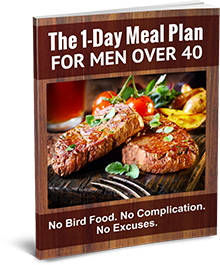How many calories do I burn a day? We'll show you how to calculate your Basal Metabolic Rate (BMR), so you'll know the exact answer!
If you're asking this question, you’re probably looking to lose weight, right? If that’s the case, you've come to the right place!
We'll show you how to work out the number of calories you burn each day based on your own individual body composition.
BMR is the estimated rate your body burns calories while resting.
Obviously, if you’re active throughout the day, then you’ll burn more calories than this, but knowing (and regularly reviewing) your BMR will help you with whatever weight management goals you have.
What I want to do in this article is answer your question — How many calories do I burn a day? — by giving you the number of calories you personally burn at a natural pace. We’ll then move on to how you can use the information to affect your weight, whether it’s to lose or gain weight.
If you don't want the amazing information behind it and want to find out quickly, check out our free calorie calculator. But if you're ready to get in-depth, let's answer the question: How many calories do I burn a day?
Learn more about BMR and burning calories!
How Many Calories Do I Burn a Day?
To find out the answer, you’ll need to know your body fat percentage or at least have a good estimate of it.
Finding out how many calories you burn a day, or what your BMR is, depends on how your body is made up of fat and fat-free tissue (muscle, bone, organs, etc.). This is known as your body composition.
The reason you need to know this is that fat is less metabolically active than fat-free tissue, so the more fat you have, the fewer calories you naturally burn each day.
For example, if a 220 lbs (100 kg) man has 30% body fat, his BMR would be 2,135 calories a day. But a 220 lbs man with only 15% body fat would have a BMR of 2,515 calories a day. As you can see, your body composition is the driver of how many calories you burn a day.
So how many calories do I burn a day? You need to know three things:
- Weight in KG's (1 KG = 2.2 lbs)
- Body-fat percentage
- The magic equation (don’t worry … it’s much less complicated than it seems)
Your weight and your body-fat percentage is your individual part, so only you will know these.
The equation, however, I will share with you now (All weights are measured in Kg):
- Weight x body-fat percentage = body-fat weight
- Weight – body-fat weight = fat-free weight
- Body-fat weight × 9 = calories burned by fat
- Fat-free weight × 28 = calories burned by fat-free tissue
- Calories burned by fat + calories burned by fat-free tissue = BMR
As an example, we’ll use our 220 lbs (100 kg), 35% body-fat friend from earlier.
- 100 × 35% = 35 kg body-fat weight
- 100 – 35 = 65 kg fat-free weight
- 35 × 9 = 315 calories burned by fat
- 65 x 28 = 1,820 calories burned by fat-free tissue
- 315 + 1,820 = 2,135 calorie BMR
So, there you have it. That’s how you can find the answer to your question, how many calories do I burn a day?
Here’s A Free Weight Loss Meal Plan For Busy Men 40+
Discover exactly what to eat for breakfast, lunch, and dinner to lose belly fat & feel energized 24/7 without hard dieting...
Now What?
OK, now you know what your BMR is, but how can you use that to affect your weight? In my opinion, knowing your BMR is one of the best first steps towards manipulating your weight, as it acts as your ‘maintenance’ calorie intake.
Your BMR will change depending on your body composition. I recommend getting a body-fat check every 4-6 weeks so you can check what your BMR is and adjust your calorie intake according to your weight goals.
For Weight Loss
If your goal is to lose weight, you should consume around 300-500 calories below your BMR, so our friend from earlier should consume around 1,635-1,835 calories per day. If he did nothing else, this would lead to a 1 lb loss every 7-11 days.
Of course, most people are in some way physically active each day, so this weight loss would be increased by adding in just 20-30 minutes of physical activity each day.

Let’s use walking as an example for this and continue to use our 220 lbs friend as our benchmark. Walking at 3 mph, he would burn around 175 calories for a 30-minute walk.
Combining that with consuming 300-500 calories under maintenance would bring around a 2.5 lb weight loss every 10-14 days.
2.5 lbs may not seem like a lot, but for a simple change to your diet and a slow 30-minute walk each day, it’s getting you going in the right direction.
Compounded over 6 months, that gives you a total loss of around 30 lbs. Not bad, huh?
How Activity Comes Into the Equation
As I've mentioned above, increasing the amount of activity you do each day will also help with your weight loss goals.
You can include this into how you work out your daily calorie intake by multiplying your BMR by the below figures.
- 1.2 points for little or no exercise.
- 1.37 points for light-intensity exercise 1–3 days per week. (walking, low-impact static bike, etc.)
- 1.55 points for moderate-intensity exercise 3–5 days per week. (jogging, water aerobics, slow-paced cycling, etc.)
- 1.725 points for hard exercise 6–7 days per week. (HIIT classes, weight training, spin class, etc.)
- 1.9 points for a very active person who either has a physically demanding job or has a particularly challenging daily exercise routine.
An example, using our 220 lbs friend again, would be worked out as below:
- BMR of 2,135 calories x 1.55 for moderate exercise = 3,310 calories needed.
- 3,310 – 300-500 reduction for weight loss = 2,810 – 3,010 daily consumption.
For Weight Gain
To gain weight, which is usually geared towards muscle gain, you should consume around 500 calories above maintenance.
When you add weight, it will be more important to keep an eye on your body fat percentage, as you want to make sure you are not gaining too much fat.
Monitoring and adjusting your calorie intake, as well as managing your intake of particular macronutrients (protein, carbs, fat), will be a big part of gaining weight.
I wanted you to understand what your BMR is based on, but if you don’t want to do the math, you can use our easy calorie calculator.
The results will be slightly different from what I have advised above, as the calculator considers your suggested activity level.
Here’s A Free 24-Min Fat Burn Workout For Busy Men 40+
This powerful workout will reignite your metabolism to burn fat 24/7 like you did in your 20s…
Adapting Diet for Calorie Intake
Now that you know how many calories you should be consuming to support your main goal, we’ll dive into the types of food you should eat to get the calories you need.
Our recommendation here at the Fit Father Project is dependent on what you want to achieve.
There is only a slight variance in the ratio, and I will explain the reasons for that below.
- Weight loss: 40% Protein, 35% Carbs, 25% Fat
- Weight gain: 35% Protein, 40% Carbs, 25% Fat
The reason the percentage of protein differs is that when you’re losing weight, you need more protein to keep you full and support muscle tissue.
If you start to lose muscle tissue due to a calorie deficit, your metabolism will drop, and it will make it harder for you to continue to lose fat.

When you are gaining weight, you will need slightly more carbs for energy and will not need to rely on protein to keep you full, as you will be in a calorie surplus anyway.
Whether your goal is to lose weight or gain weight, your food choices should still be the same, eating clean foods that supply healthy calories that support your body.
Recommendations for each macronutrient:
- Protein: chicken breast, sardines, eggs, turkey, lean beef
- Carbohydrates: sweet potato, quinoa, brown rice, Ezekiel bread
- Fats: avocado, MCT or coconut oil, cold-pressed olive oil
- Vegetables: broccoli, spinach, asparagus, kale, arugula
With just these ingredients, you can make some amazing meals!
Here’s a FREE Meal Plan & Workout For Busy Men 40+
We’ll show you exactly what to eat & how to exercise to reignite your metabolism in your 40’s, 50’s & 60’s.
Stuart gained his Diploma in Personal Training & Sports Medicine through Premier Global, back in 2001. In 2018, he completed his Level 1 Precision Nutrition qualification. Throughout his career in Fitness, Stuart has trained hundreds of clients, worked in almost every position in the industry, and ran his own successful training studio. After a hiatus away from the Fitness industry, working in Corporate Management and Finance, Stuart returned to what he loves… Fitness! This return led to a chance meeting with Dr. Balduzzi, and a place in the Fit Father Project team.Stuart Carter, Dip. PT, Precision Nutrition 1
C.O.O., The Fit Father Project
The FOUNDATIONS Program is created by Dr. Anthony Balduzzi for Men 40+ who want Lifelong Health. In just 6-Weeks following FOUNDATIONS, you'll experience: FOUNDATIONS has transformed 60,000 lives! Are you ready to experience true lasting health & results?Join our 6-Week Doctor Designed Health Program. You'll Gain Foundational Health for the Rest of Life.
*Please know that weight loss results & health changes/improvements vary from individual to individual; you may not achieve similar results. Always consult with your doctor before making health decisions. This is not medical advice – simply very well-researched info on answering the question, how many calories do I burn a day?






